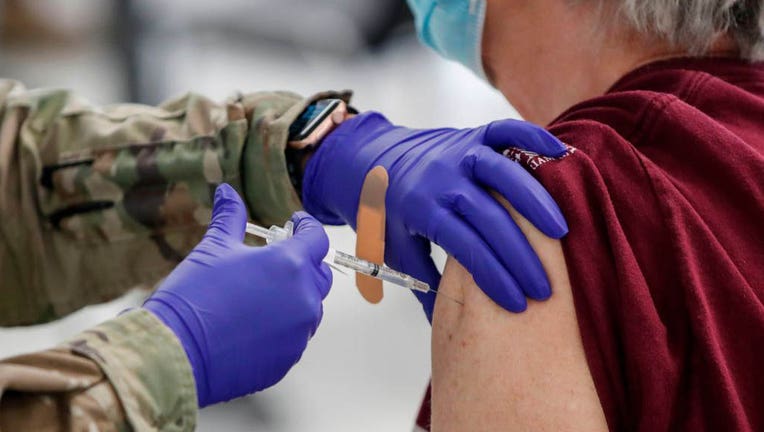Swollen lymph nodes following COVID-19 vaccination could mean you already had virus, study suggests

FILE - A woman receives a Pfizer COVID-19 vaccine at a vaccination center established at the Triton College in River Grove, Illinois, on Feb. 3, 2021. (Photo by KAMIL KRZACZYNSKI/AFP via Getty Images)
Since the rollout of the COVID-19 vaccine, public health officials have warned of the possible side effects following vaccination, such as pain at the injection site, fever, or muscle aches, among others. But a new study suggests that some recipients may experience swollen lymph nodes after receiving the jab, a side effect that the researchers found was more common among those who already had a coronavirus infection.
Researchers in a study recently published to the preprint server medRxiv analyzed some 947 health care workers in the United Kingdom who received their first dose of the Pfizer-BioNTech COVID-19 vaccine. About 265 of those health care workers had already been infected with the novel virus prior to vaccination, the study authors said.
MORE NEWS: Orange County rolls out 3-phase plan to do away with face masks
The study, which has not yet been peer-reviewed, found that lymphadenopathy (swollen lymph nodes) was more common in those who were previously infected with the novel virus. About 4% of those who had already battled COVID-19 reported this side effect post-vaccination, compared to the less than 1% of those who were not previously infected.
What’s more, other side effects such as fever, fatigue, muscle, and joint pain were more common among those previously infected, with 8% of those with a previous COVID-19 infection reporting fever as a side effect. Meanwhile, just 2% of those who had never been infected said they experienced a fever.
MORE NEWS: Biden address to Congress: What time, how to watch and what he’ll say
Muscle pain and fatigue were among those who had already been infected with the virus, at 30% and 29%, respectively. Meanwhile, muscle pain was reported among 15% of recipients who had no previous coronavirus infection, while fatigue was reported among 20% of vaccine recipients in this group.
"In a survey-based observational study, healthcare workers in the United Kingdom reported AEs experienced after their first dose of BNT162b2/Pfizer vaccine. Prior COVID-19 infection, but not Long-COVID, were associated with increased risk of self-reported AEs including lymphadenopathy post-vaccination," the study authors concluded. "Duration since COVID-19 infection did not affect severity of AEs."
Get updates on this story from FOXNews.com.
Tune in to FOX 35 Orlando for the latest Central Florida news.

